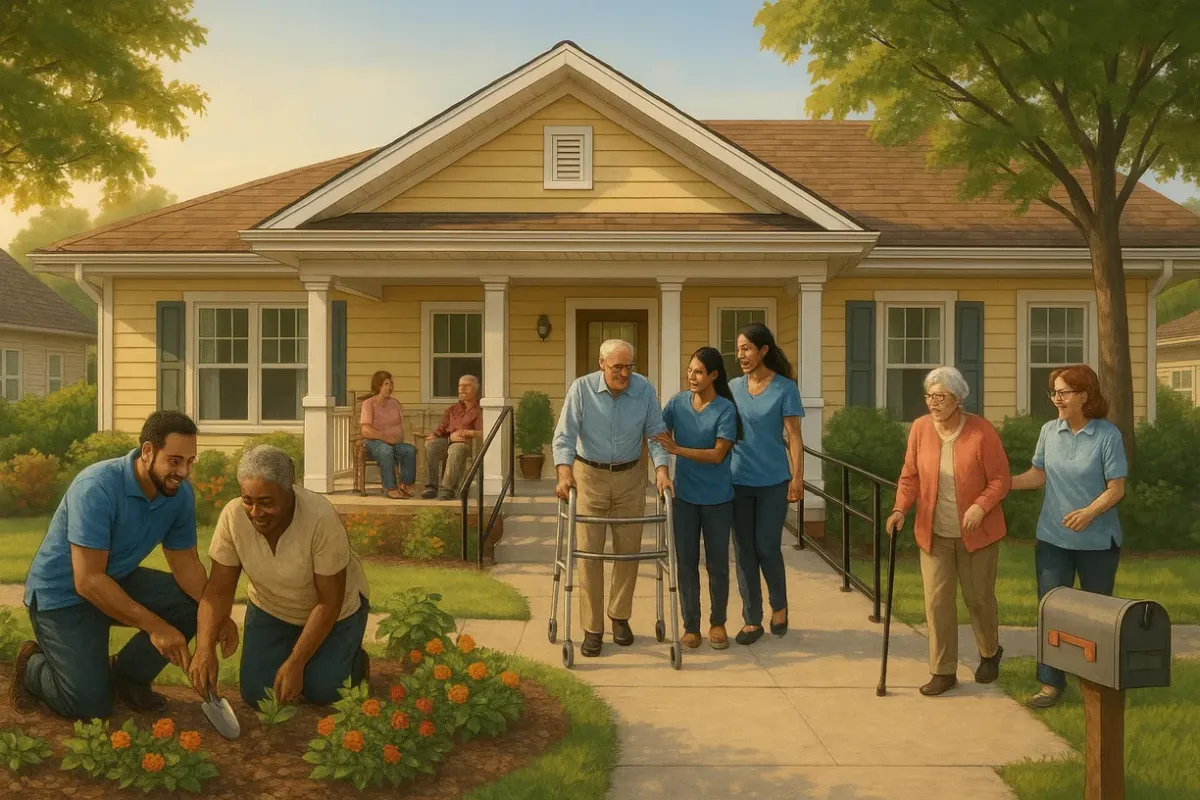
Understanding Group Home: Meaning and Definition Simplified
What Is the Meaning and Definition of a Group Home?
When families begin exploring long-term care options, one term often surfaces but isn't always fully understood: group home. In North Carolina and across the country, group homes play a vital role in providing residential care and support to individuals who need help with daily living—but want to retain a sense of independence and community. Whether supporting individuals with disabilities, mental health conditions, or seniors in need of assisted living, group homes are a cornerstone of inclusive and compassionate health care.
What Is a Group Home and Who Does It Serve?
A group home is a residential care setting designed to support individuals who cannot live independently due to health conditions, intellectual disabilities, psychiatric needs, or aging-related limitations. Group homes are commonly licensed under state law and regulation, including oversight by agencies like the North Carolina Department of Health and Human Services.
They serve a diverse population: from youth in foster care and adults with developmental disabilities to seniors transitioning from a nursing home or needing help with activities of daily living.
How Is a Group Home Defined?
Group homes are defined as small-scale residential facilities that provide room, board, and 24/7 supervision. They typically house six to ten individuals and are embedded within residential neighborhoods, offering an accessible and family-like environment. Unlike institutional settings, group homes prioritize autonomy, socialization, and community integration.
Who Typically Lives in Group Homes?
Residents may include:
•Adults with intellectual or developmental disabilities
•Youth in child care or foster care systems
•Individuals with mental health or psychiatric diagnoses
•Seniors needing assistance but not full nursing care
In North Carolina, group homes also accommodate individuals transitioning from hospitals, emergency shelters, or correctional institutions who require ongoing residential support.
What Are the Main Purposes of Group Homes?
Group homes aim to:
•Enable independent living within a supportive environment
•Provide medical oversight, personal care, and behavioral support
•Encourage community participation and daily routine development
•Support physical and emotional well-being through structured programs
What Are the Different Types of Group Homes?
There are several types of group homes based on residents' needs:
Group Homes for Intellectual and Developmental Disabilities
These homes offer tailored residential services, behavioral therapy, and support for individuals requiring lifelong care and assistance.
Group Homes for Mental Health and Psychiatry
Designed for residents managing mental illness or recovering from crisis, these homes provide access to psychiatric services, case managers, and medication management.
Senior Group Homes and Adult Foster Care
These homes support elderly adults who don't require skilled nursing but benefit from assistance with medication, meals, and hygiene. Many operate as alternatives to nursing homes or assisted living communities.
What Services Are Typically Offered in Group Homes?
While services vary, most include:
•Medication management
•Assistance with activities of daily living (ADLs)
•Meal preparation and nutrition planning
•Laundry, hygiene, and housekeeping
•Access to physical and behavioral therapy
•Emergency response protocols
•Transportation for medical appointments and community outings
What Regulations and Legal Requirements Govern Group Homes?
Group homes in North Carolina must comply with strict licensing standards, including:
•Staff background checks and certification
•Safety inspections and accessibility features
•Resident rights compliance, such as privacy and consent to care
•HIPAA regulations for data protection
•Adherence to state and federal Medicaid requirements when applicable
These homes are subject to routine inspections by the North Carolina Division of Health Service Regulation to ensure quality, safety, and proper staffing.
What Are the Key Benefits of Living in a Group Home?
Group homes are designed to balance independence and support, offering several benefits:
•A smaller, more personalized setting than larger institutions
•Improved mental health from living in a community-focused space
•Access to both social activities and one-on-one attention
•Lower costs than private care homes or nursing facilities
•Stable routines that foster emotional stability and physical safety
Why Are Group Homes Cost-Effective?
Compared to nursing homes or hospital-based care, group homes offer:
•Shared resources that reduce total expense
•Inclusion in Medicaid waivers and other state assistance programs
•Flexible payment models based on income, Medicaid eligibility, or sliding scales
Some facilities also offer Medicaid-approved services, making them more accessible to families managing limited resources.
How Can You Find and Choose the Right Group Home?
Finding a reputable group home begins with research. Here's how:
•Contact a senior placement service like Tarheel Senior Placement for personalized recommendations
•Search state-licensed directories and ensure proper certification
•Ask about staff credentials, patient-to-caregiver ratios, and therapy services
•Tour the facility to assess cleanliness, accessibility, and community atmosphere
Questions to Ask During a Visit:
•What is your staff-to-resident ratio?
•Are there licensed nurses or health professionals on site?
•What is the process for handling emergencies or behavioral health crises?
•How do you support residents with mobility challenges or disabilities?
•Is transportation available for medical visits, groceries, and activities?
Final Thoughts: A Safe, Supportive Option for Vulnerable Populations
Group homes offer a powerful combination of compassion, structure, and personal freedom for individuals who need long-term care but don't require institutionalization. Whether your loved one is aging, managing a psychiatric disorder, or living with a disability, these homes offer a secure and community-centered option.
At Tarheel Senior Placement, we specialize in helping families across North Carolina find the best-fit residential care—from group homes to assisted living and independent living alternatives. If you're unsure where to begin, reach out to our team. We'll walk you through your options with clarity, warmth, and expert support.

